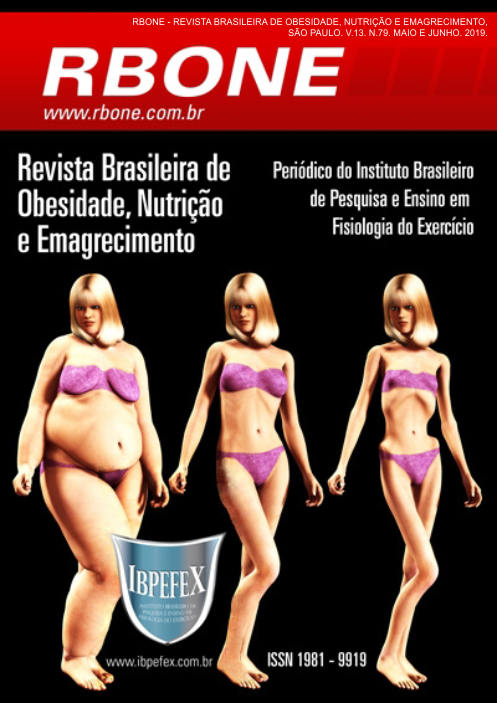Evaluation of the effect of a gluten-restricted diet on biochemical parameters, oxidative stress, MCP-1 and leptin in overweight and obese subjects: a pilot study
Abstract
Obesity is a disease caused by energy imbalance and excess body fat. It can be diagnosed by Body Mass Index (BMI), where the person's weight in kilograms (kg) is divided by height, in meters (m), squared. In this way a person with a BMI equal to or greater than 25 is classified as overweight, and when the BMI of 30 or more is considered obese. The inclusion of a lifestyle diet is a widely used method without treatment and prevention of this disease, so it is important that this diet acts directly in the inflammatory process. The gluten-free diet may be helpful in reducing fat gain, inflammation and insulin resistance, and can prevent the development of obesity and metabolic disorders. Objective: To analyze the anthropometric profile, MCP-1, leptin and biochemical markers and oxidative stress of the participants after one month of a gluten-free diet. Methods: individuals were submitted to blood collections and were performed as anthropometric measures, before adherence to the diet and after one month. Results: significant differences in the pre-post intervention comparison in body mass, waist circumference, waist circumference, total cholesterol and triglycerides. Conclusion: the gluten-free diet was able to modify the anthropometric measures and the biochemical markers, to a greater extent in the eutrophic and overweight individuals.
References
-Brar, P.; e colaboradores. Change in Lipid Profile in Celiac Disease: Beneficial Effect of Gluten-Free Diet. American Journal of Medicine. Vol. 119. Núm. 9. p. 786-790. 2006.
-Cheng, J.; e colaboradores. Body Mass Index in Celiac Disease Beneficial Effect of a Gluten-free Diet. Clinical Gastroenterology. Vol. 44. Núm. 4. p. 267-271. 2010.
-Davis, W. How not to have high triglycerides | Dr. William Davis. Disponível em: <http://www.wheatbellyblog.com/2015/01/high-triglycerides/>. Acesso em: 18/01/2017.
-Ediger, T. R.; Hill, I. D. Celiac disease. Pediatrics in Review. Vol. 35. Núm. 10. p. 409-415. 2014.
-Fardet, A. Wheat-based foods and non celiac gluten/wheat sensitivity: Is drastic processing the main key issue? Medical Hypotheses. Núm. September. 2015.
-Ferretti, G.; e colaboradores. Celiac disease, inflammation and oxidative damage: A nutrigenetic approach. Nutrients. Vol. 4. Num. 4. p. 243-257. 2012.
-Francischi, R. P. P.; e colaboradores. Obesidade: atualização sobre sua etiologia, morbidade e tratamento. Revista de Nutrição. Vol. 13. Núm. 1, p. 17-28. 2000.
-Holmer-Jensen, J.; e colaboradores. Differential effects of dietary protein sources on postprandial low-grade inflammation after a single high fat meal in obese non-diabetic subjects. Nutrition journal. Vol. 10. Núm. 1. p. 115. 2011.
-Maggio, M. C.; e colaboradores. Gluten-free diet impact on leptin levels in asymptomatic coeliac adolescents: One year of follow-up. Hormone Research. Vol. 67. Núm. 2. p. 100-104. 2007.
-Ministério da Saúde. Vigilância de fatores de risco e proteção para doenças crônicas por inquérito telefônico. 2014.
-Odetti, P.; e colaboradores. Oxidative stress in subjects affected by celiac disease. Free radical research. Vol. 29. Núm. 1. p. 17-24. 1998.
-Sapone, A.; e colaboradores. Spectrum of gluten-related disorders: consensus on new nomenclature and classification. BMC medicine. Vol. 10. p. 13. 2012.
-Shai, I.; e colaboradores. Weight Loss with a Low-Carbohydrate, Mediterranean, or Low-Fat Diet. New England Journal of Medicine. Vol. 359. Núm. 3. p. 229-241. 2008.
-Soares, F. L. P.; e colaboradores. Gluten-free diet reduces adiposity, inflammation and insulin resistance associated with the induction of PPAR-alpha and PPAR-gamma expression. The Journal of nutritional biochemistry. Vol. 24. Núm. 6. p. 1105-1111. 2013.
-Tay, J.; e colaboradores. Metabolic Effects of Weight Loss on a Very-Low-Carbohydrate Diet Compared With an Isocaloric High-Carbohydrate Diet in Abdominally Obese Subjects. Journal of the American College of Cardiology. Vol. 51. Núm. 1. p. 59-67. 2008.
-Ukkola, A.; e colaboradores. Changes in body mass index on a gluten-free diet in coeliac disease: A nationwide study. European Journal of Internal Medicine. Vol. 23. Núm. 4. p. 384-388. 2012.
-WHO. Obesity and overweight. 2014. Disponível em: <http://www.who.int/mediacentre/factsheets/fs311/en/>. Acesso em: 4/09/2016.
Authors who publish in this journal agree to the following terms:
- Authors retain the copyright and grant the journal the right of first publication, with work simultaneously licensed under the Creative Commons Attribution License BY-NC which allows the sharing of the work with acknowledgment of the authorship of the work and initial publication in this journal.
- Authors are authorized to enter into additional contracts separately for non-exclusive distribution of the version of the work published in this journal (eg, publishing in institutional repository or book chapter), with acknowledgment of authorship and initial publication in this journal.
- Authors are allowed and encouraged to post and distribute their work online (eg, in institutional repositories or on their personal page) at any point before or during the editorial process, as this can bring about productive change as well as increase impact and impact. citation of published work (See The Effect of Free Access).






